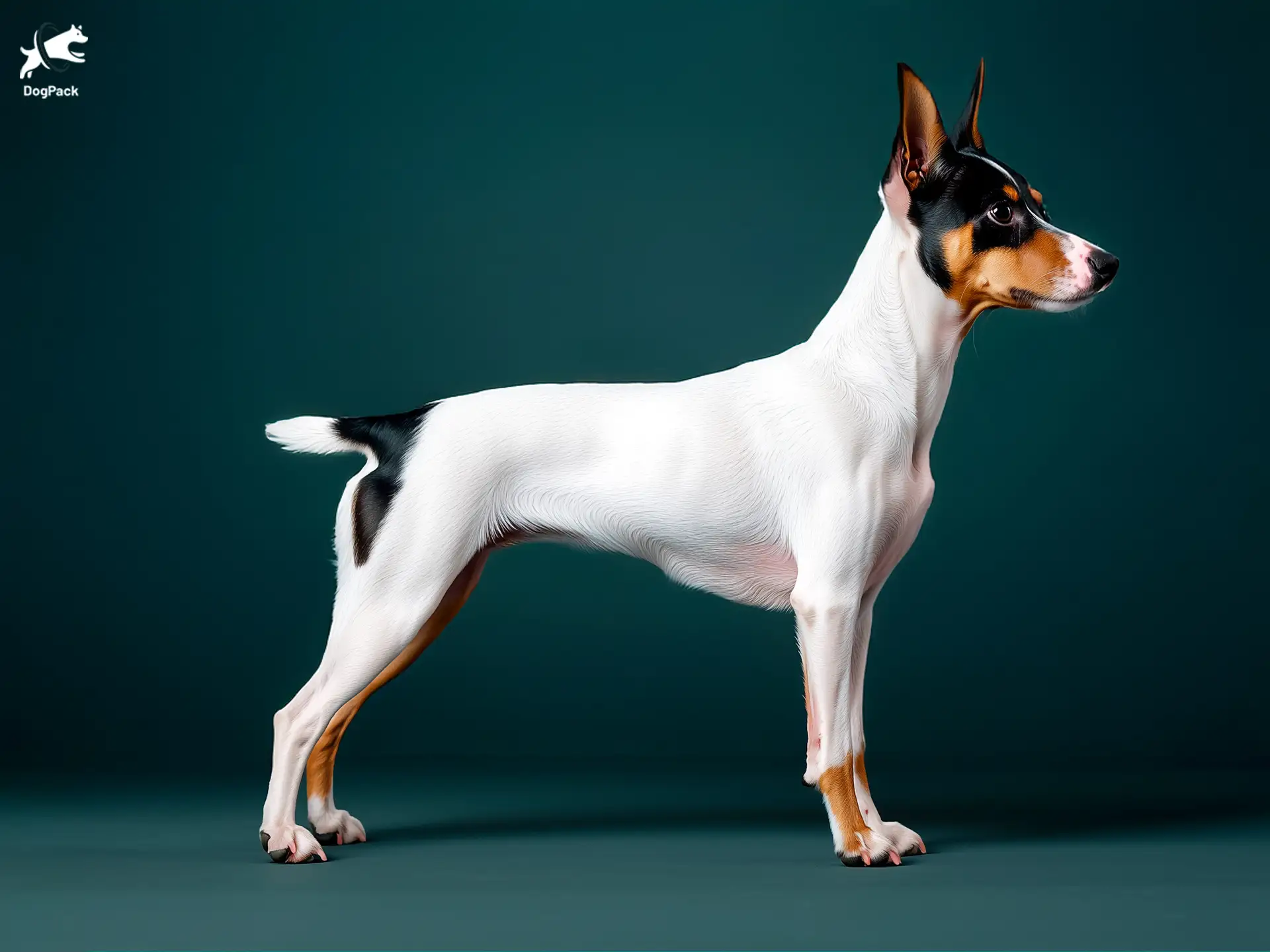Mountain Feist Dog Breed Info & Overview
The Mountain Feist is a lively, intelligent hunting dog known for its agility and determination. Originally bred for tracking small game, this energetic breed thrives in active households. With sharp instincts and a strong prey drive, Mountain Feists are both independent and deeply loyal. Their playful nature and fearless attitude make them an excellent companion for adventurous owners.
Characteristics
Pictures
Breed History
Centuries ago, the term “Feist” referred to small, feisty dogs used for clearing out vermin on rural homesteads. Local hunters in the southern United States developed these canines for efficiency: they needed a dog that could track, chase, and tree game quickly. While not as famous as some American dog breeds, they became invaluable for families who relied on them for sustenance and protection.
In the early days, different local strains of Feists existed, each with slight variations. However, the Mountain Feist emerged as a spirited, compact hunter known for its resilience in rugged terrains. Over time, breeders honed their abilities by focusing on intelligence, agility, and an unwavering desire to pursue small game. These traits turned them into trusted farmhands and cherished companions in tight-knit communities.
Even as larger hunting dogs gained popularity, the Mountain Feist retained a loyal following among those who prized its no-nonsense work ethic. Generations of selective breeding helped refine its natural instincts, giving today’s Feist the knack for treeing squirrels, rabbits, and other critters. This rich history reflects a breed shaped by necessity and environment, always ready to serve its human partners in the field.
Temperament, Personality
Friendly yet driven, these dogs form quick bonds with family members. Though they may be reserved around strangers at first, socialization from a young age helps them adapt confidently to various situations. Their keen senses and curiosity make them alert watch dogs, keeping an eye (and ear) out for any odd happenings. A Mountain Feist loves being right in the action, especially when it involves outdoor fun.
Many owners find these dogs surprisingly cuddly once they’re done dashing around the yard. Though their hunter’s heart pushes them toward adventure, they’re also capable of winding down for quality time on the couch. This mix of liveliness and affection suits families who want an active pal that doesn’t mind snuggling up later. With consistent guidance, they’re usually good with kids, but supervision is always wise.
Because they’re bold and self-assured, early training plays a significant role in shaping a courteous adult dog. That spirited nature, coupled with a desire to explore, can get them into mischief if they lack a proper outlet. Owners who appreciate a loyal, bright, and occasionally cheeky companion find that the Mountain Feist delivers charm, loyalty, and plenty of entertaining antics around the home.
Physical Characteristics
Although they’re firmly on the small side, these dogs carry themselves like much bigger canines. They have lean, athletic builds that allow them to dart after prey in the blink of an eye. Short-haired coats, usually in colors like black, brindle, or tan, make grooming easier and highlight the breed’s streamlined frame. Overall, they look ready to spring into action at any given moment.
Many possess a medium-length muzzle and expressive eyes that speak to their sharp awareness of everything around them. Their ears can be semi-prick or buttoned down, giving each individual dog a slightly unique appearance. A stiff tail—sometimes naturally bobbed—contributes to their quick balance changes when in pursuit. Mountain Feist enthusiasts often say you can spot these dogs a mile away due to their lively stance.
Being light on their feet, they exude agility even during casual strolls. While they’re definitely compact, there’s a robust quality in their muscle tone from generations of practical breeding. Healthy posture and bright eyes are good indicators that your dog is feeling its best. Although they have a classic “terrier-like” vibe, the Mountain Feist stands apart thanks to its keen hunting heritage and American frontier spirit.
Health Issues
Like many rare dog breeds, these pups generally enjoy robust health. However, they can still face certain risks. Hip dysplasia, though less common in smaller dogs, can occasionally appear, making regular checkups essential. A balanced diet and moderate exercise help keep their joints in top condition. Vigilance ensures any concerns are spotted early and addressed promptly with professional veterinary guidance.
They’re also susceptible to skin irritations, especially if fleas or ticks go unchecked. Being highly active, they may pick up scrapes and scratches outdoors. Consistent grooming sessions allow you to check for lumps, bumps, or pests that could cause discomfort. While not prone to severe hereditary ailments, it’s wise to discuss genetic testing with your vet to rule out issues hidden in a dog’s lineage.
Regular dental care is another key step, as smaller breeds can experience tartar build-up leading to periodontal disease. Incorporating dental chews or brushing routines can make a big difference in long-term oral health. Annual vet visits, heartworm prevention, and a schedule of core vaccinations are the backbone of a healthy life. A well-monitored Mountain Feist typically stays vibrant and adventurous for many years.
Grooming Needs
If you’re not a fan of high-maintenance grooming, you’re in luck. Short coats on these dogs reduce the need for elaborate brushing routines. Typically, a weekly once-over with a soft-bristle brush keeps shedding manageable and helps maintain coat shine. A quick wipe-down after outdoor adventures also goes a long way, as dirt and debris can cling to their fur during their enthusiastic exploits.
Despite their minimal shedding, these canines benefit from regular nail trims, especially when they’re spending plenty of time dashing around uneven terrain. Overgrown nails can lead to discomfort or altered gait. Routine ear checks also prevent wax build-up and potential infections. With consistent attention to these small details, a Mountain Feist remains ready for action and free from discomfort caused by neglected grooming tasks.
Baths are generally needed only when they get notably dirty, but using a gentle dog shampoo can preserve their natural coat oils. Make sure to keep baths quick and stress-free, as a tense bathing experience might sour them on water. A once-a-month bath is often enough for most individuals. Ultimately, grooming a Mountain Feist is a relatively simple affair that fits nicely into a busy lifestyle.
Exercise Requirements
Their high energy means you’ll want to set aside active playtime daily. Think brisk walks, fetch sessions, or even agility training. These dogs excel when they have a “job” to do, so they might thrive in organized sports, like barn hunt or trick competitions. A fenced yard is a big plus, as they love to zip around. Without enough mental and physical stimulation, boredom can lead to mischief.
Squirrel-chasing instincts remain strong, so it’s crucial to keep them securely on leash or in a contained space, especially near wooded areas. They’re always scanning for movement, making them apt to dash off after rodents. You can burn off energy through hikes, treasure hunts, or advanced training that taps into their quick-witted nature. A well-exercised Mountain Feist is a calm, content companion indoors.
For owners with limited outdoor space, creative indoor activities like puzzle toys or hide-and-seek can help fill gaps. Their compact size means a moderate living space can still work—provided you engage them sufficiently each day. If you’re someone who loves long weekend adventures, this breed will happily tag along. Keeping a good exercise routine ultimately prevents restlessness and fosters a strong, well-behaved family dog.
Training Tips
Smart and eager, these pups can be quick learners when consistency is front and center. Short, upbeat sessions often produce better results than lengthy drills. They respond well to praise, treats, and positive reinforcement, especially if you keep training fun and varied. Repetitive tasks can bore them, so mix it up with trick commands or short agility runs to hold their interest.
Because they’ve historically been bred for hunting, they might show a streak of independence. Early socialization is pivotal, introducing them to other small dog breeds and different environments. This helps curb any excessive wariness and sets the stage for polite behavior. If you notice stubborn moments, stay patient and remember that gentleness usually wins out with a sensitive Mountain Feist.
Crate training can be a practical way to establish boundaries and give them a den-like retreat. Teaching a solid recall is critical, given their propensity to chase whatever scampers by. Reward them generously whenever they come back on command, reinforcing that “returning” leads to positive outcomes. Ultimately, a blend of firmness, encouragement, and playful challenges fosters an obedient, well-rounded companion in all sorts of settings.
Nutrition, Diet
Unlike many small hunting dogs, Mountain Feists often need a diet that supports their energetic and lean frames. High-protein kibble from reputable brands can maintain muscle mass and overall health. Aim for formulas with real meat as the first ingredient, avoiding fillers that provide empty calories. Because these dogs burn off energy quickly, a balanced ratio of healthy fats helps sustain stamina.
Adult Feists weighing around 20 pounds typically consume 1 to 1.5 cups of quality dry food per day, divided into two meals. Owners with highly active dogs—those who regularly hunt or engage in intense sports—may slightly increase portions to account for extra calorie burn. However, be mindful of overfeeding, as these pups can gain weight fast if given excessive treats or table scraps.
Monitoring body condition is essential: you want to feel their ribs without them protruding. When in doubt, consult a veterinarian to adjust serving sizes based on your dog’s age, activity level, and overall health. Some Feist owners add small amounts of fresh vegetables or lean meats to create variety, but consistency matters to avoid digestive troubles. A well-structured diet keeps a Mountain Feist primed for every escapade.
Adoption, Breeders
Those seeking a Mountain Feist can look for specialized rescues focusing on working breeds or for family dog breeds where these pups occasionally appear. Local shelters sometimes have Feist mixes, though purebreds are less common. Always verify the dog’s health and temperament by asking questions about vet records and socialization history, especially if you’re adopting a slightly older companion.
Breeders who prioritize healthy litters will provide a thorough medical background, including any genetic testing that ensures robust puppies. Look for references or testimonials from previous buyers to gauge the breeder’s reputation. Ethical breeding practices emphasize socializing pups from birth and matching each dog to a suitable home environment. This diligence sets you up for a happy, lifelong relationship with your new four-legged friend.
For more detailed insights and connections within the Feist community, join the Mountain Feist Association Facebook group to learn from dedicated owners and enthusiasts. You can also explore the American Treeing Feist Association for breed standards, events, and additional breeder contacts. Engaging with trusted sources is a smart step toward welcoming an enthusiastic hunter and loyal pal into your home.
Family Pet?
For the right household, this breed blends playfulness with affectionate devotion. While they do best with families that can match their energy, they often forge strong bonds with children who respect a dog’s boundaries. Supervision around young kids is always advised to keep rough play in check. A Mountain Feist thrives with people who involve it in daily activities and offer mental stimulation.
Socialized from puppyhood, they’re generally accepting of other pets, though their prey drive can kick in if smaller animals scurry about. Cats might require careful introductions, and some Feists never fully let go of the urge to chase. If you’re prepared for lots of games and an occasional comedic moment, this breed’s knack for entertainment can bring plenty of laughter to family life.
Thanks to their loyal natures, they’ll often be found tailing their favorite person around the house. They relish the chance to be part of group outings, be it a weekend hike or an impromptu backyard adventure. Families ready to meet their exercise needs and encourage positive interactions with neighbors or guests will find a reliably cheerful and protective companion right at home.
Right For You?
If your ideal dog is alert, active, and thrilled to join you on outdoor escapades, this might be your perfect match. People who appreciate a curious, free-spirited pet usually love this breed’s inquisitive nature. However, apartment living can be challenging if daily mental and physical exercises are not provided. A Mountain Feist does best in a setting that accommodates its boundless energy and desire for exploration.
Think about your schedule and whether you have the time for training, walks, and adventures. These dogs don’t like boredom; they flourish in homes where interaction is plentiful. If you’re interested in dog sports or simply want a lively partner to keep you moving, this breed meets the mark. For those wanting a loyal, spirited companion with deep American roots, the Feist could be a match made in canine heaven.
Yet, a soft spot for a bit of mischief is recommended. These pups aren’t couch potatoes, and their intelligence drives them to find ways to amuse themselves if left alone. Before committing, weigh whether your lifestyle aligns with a high-energy companion. Still, many find the trade-offs worthwhile. Embracing that unstoppable curiosity opens the door to a fulfilling journey with a dog that’s truly one-of-a-kind.
Conclusion
Short and compact, yet brimming with confidence, these dogs exemplify an all-American spirit of adventure. Prospective owners who relish active pastimes and welcome a playful, intelligent sidekick will be rewarded with unwavering loyalty. Adopting a Mountain Feist means embracing a tradition rooted in frontier hunting heritage—one that can brighten your home, keep you on your toes, and bring a dash of fun into your daily routine.
FAQs
-
How does the Mountain Feist differ from other Feist breeds?
The Mountain Feist is larger and more muscular than other Feist breeds, with a strong prey drive and keen hunting instincts. Unlike the Treeing Feist, which primarily hunts by scent, Mountain Feists rely on a blend of sight and scent tracking to locate squirrels and small game.
-
Is the Mountain Feist an officially recognized breed?
Yes, the United Kennel Club (UKC) recognizes the Mountain Feist as a distinct breed. However, it is not yet recognized by the American Kennel Club (AKC). Breed enthusiasts continue to promote its historical significance and working abilities.
-
What type of hunting is the Mountain Feist best suited for?
The Mountain Feist excels at squirrel and small game hunting, using its sharp eyesight, keen nose, and natural agility to track and tree prey. They are also adept at hunting rabbits, raccoons, and even wild boar in rugged terrains.
-
Do Mountain Feists make good off-leash dogs?
Yes, Mountain Feists are loyal and bond closely with their owners, making them relatively reliable off-leash. However, due to their strong prey drive, early training with recall commands and structured socialization is essential to prevent them from chasing wildlife.
-
Are Mountain Feists good for first-time dog owners?
Mountain Feists are high-energy, intelligent dogs that thrive in active households. While they are highly trainable, their strong-willed nature and hunting instincts can be challenging for first-time owners. Experienced handlers or those willing to commit to regular training will have the best experience with this breed.
Breed Ratings
The Mountain Feist is sharp, quickly learning new tasks but can lose interest if training becomes repetitive.
Expect constant requests for games, chases, and interactive toys—this breed rarely runs out of energy.
Bred for hunting, they thrive on activity and need daily exercise to stay mentally and physically fit.
Their short coat sheds lightly but benefits from weekly brushing to remove loose hair.
Originally developed to chase small game, they maintain a strong instinct to pursue moving targets.
A short coat means minimal brushing is needed, although ear checks and nail trims are essential.
They learn quickly but can be independent, so patience and consistent positive reinforcement are key.
Extended isolation can lead to boredom or destructive habits; they crave human interaction.
These dogs alert their owners to anything suspicious, especially if prey is within sight.
Minimal drooling makes them a good choice for owners who prefer a tidy living space.
Generally sociable, but they do best when introduced properly and supervised around unfamiliar dogs.
They’re relatively healthy, though proactive vet care and proper nutrition help ensure longevity.













